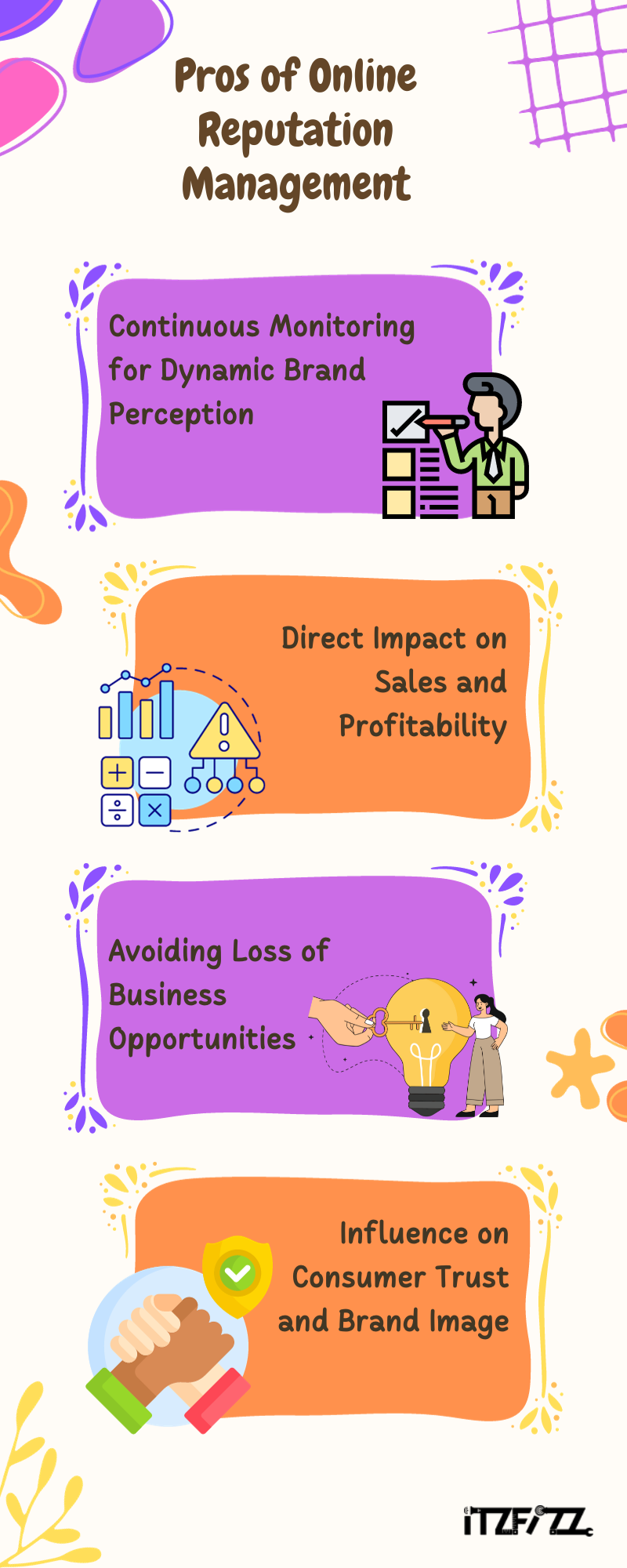Table of Contents
- What is the essence of online reputation management?
- Pros of Online Reputation Management
- Customer loyalty and positive reputation
- Building a Positive Image Through Reviews
- How Positive Reviews Help Increase Customer Loyalty
- Harnessing Social Media for Enhanced Internet Public Image
- Strengthening customer relations through effective content creation and service
- Responding to negative comments quickly and effectively
- Utilising Search Engine Optimisation in Online Reputation Management
- Marketing Strategies to Promote Your Brand’s Reputation
- Conclusion
- Frequently Asked Questions
What is the essence of online reputation management?
In today’s digital age, a company’s online image is just as important as its physical presence. This is where online reputation management (ORM) enters the picture. But, exactly, what is ORM?
To develop and maintain an organisation’s digital reputation, online reputation management combines modern marketing, search engine optimisation (SEO), and public relations methods. The essence of ORM is the ability to monitor, detect, and modify a brand’s online image.
In a world where user-generated content is always changing, a brand’s perception can fluctuate dramatically. ORM entails monitoring how a brand is cited across various online channels, such as social media, search engines, and review sites.
It also includes replying to feedback in a manner that nurtures and enhances the brand’s online image. The ultimate goal of ORM is to ensure that an organisation’s online presence genuinely reflects its core values, beliefs, and intended brand image, while simultaneously managing search engine rankings and handling any content that could tarnish the brand’s reputation.
In essence, online reputation management is not just about managing content uniformity; it’s about managing perception. It’s an ongoing process of crafting and maintaining a positive online presence, crucial for businesses to thrive in the internet-driven marketplace.
Pros of Online Reputation Management

Understanding the value of online reputation management (ORM) is pivotal for businesses aiming to establish a strong digital presence. The benefits of ORM are extensive and multifaceted, playing a significant role in a company’s success.
- Continuous Monitoring for Dynamic Brand Perception:
Online reputation management involves vigilant monitoring of how a brand is perceived online.
With the ever-changing nature of online content, this monitoring helps in adapting to shifts in public perception, which is crucial for maintaining a positive brand image. - Direct Impact on Sales and Profitability:
ORM significantly influences consumer purchase decisions. A majority of consumers read online reviews before purchasing, with positive reviews greatly increasing the likelihood of sales.
According to a Harvard Business School study, an increase in star ratings on review sites can boost revenue by up to 9%. This illustrates the direct financial benefits of effective ORM. - Avoiding Loss of Business Opportunities:
A proactive ORM approach helps in averting the potential loss of new business leads and sales.
It’s been observed that a substantial part of a company’s market value is linked to its online reputation, making ORM a critical aspect of business strategy.
4. Influence on Consumer Trust and Brand Image:
Positive online reviews contribute to building consumer trust and a favourable brand image.
Companies with a strong professional reputation are perceived as more trustworthy and reliable, leading to an increased customer base and loyalty.
Customer Loyalty and Positive Reputation
The interconnection between customer loyalty and a business’s online reputation is profound and has far-reaching implications.
- Building Trust and Credibility:
A positive online reputation is instrumental in developing trust and credibility with the target audience. When potential customers encounter positive reviews and feedback, it significantly bolsters their confidence in the brand. This trust is a fundamental building block for cultivating long-term customer relationships and loyalty. - Transforming customers into brand advocates:
Effective ORM not only retains loyal customers but also turns them into advocates for the brand. By addressing reviews and social media comments, businesses show that they value customer feedback, enhancing customer satisfaction and loyalty. Customer satisfaction is frequently a loud booster of the brand, improving its reputation and organic traffic. - Impact on Brand Perception and Customer Retention:
A well-managed online reputation ensures that any negative perceptions are quickly addressed, maintaining a positive brand image. This responsiveness is crucial for retaining customers who might otherwise switch to competitors due to negative experiences or perceptions.
Building a Positive Image Through Reviews
The impact of online reviews on a company’s image cannot be overemphasised. Positive reviews are critical to developing a positive brand image. Customers frequently rely on these online reviews as a reliable source of information when determining whether or not to engage with a brand. Businesses with a high number of favourable evaluations are perceived as genuine and trustworthy, drawing more clients.
Bad reviews, on the other hand, can severely damage a brand’s image. As a result, constantly tracking and responding to online reviews is a vital component of ORM, allowing firms to maintain a positive image while efficiently addressing any negative feedback. This proactive approach not only mitigates the risk of negative reviews but also indicates a commitment to customer satisfaction and continual improvement.
How Positive Reviews Help Increase Customer Loyalty
Online reputation through reviews plays a vital role in enhancing customer loyalty. They act as a testament to a business’s quality and reliability, encouraging repeat business and fostering a loyal customer base. When customers see that a business is well-received by others, their trust in the brand increases, making them more likely to return and recommend the business to others.
Additionally, positive reviews provide valuable feedback, helping businesses understand and meet customer expectations better. By using this feedback constructively, businesses can improve their offerings and service quality, further solidifying customer loyalty and satisfaction.
Harnessing Social Media for Enhanced Internet Public Image
In today’s internet-centric world, a robust social media presence is integral to maintaining a positive public image. Social media accounts are not just digital marketing tactics; they are dynamic platforms for showcasing brand consistency and authenticity. Inconsistent content across social media sites can lead to a fragmented brand image. Therefore, it’s crucial to maintain a coherent narrative across all social media channels, from Facebook to Instagram SEO.
Effective social media marketing involves not only regular updates but also engaging with the audience to build social proof. By actively managing social media profiles, businesses can ensure that their online persona resonates with their brand ethos, fostering trust and credibility. This strategic approach to social media enhances the overall reputation of a business, leveraging these powerful platforms to reinforce a positive public image.
Strengthening Customer Relations through Effective Content Creation and Service
The cornerstone of building effective reputation management strategies in the digital age lies in mastering customer relations, especially through customer service and content creation. By understanding customer sentiment, businesses can tailor their content to resonate more effectively with their audience.
This is crucial, as people search for authenticity and responsiveness in brands they interact with on platforms like Google Search. The content a business creates and its responsiveness to customer inquiries are significant ranking factors in online visibility.
One of the essential aspects of maintaining a positive image is providing exemplary ORM services, as it directly influences how a business is perceived. Managing these elements effectively ensures that a business not only meets but exceeds customer expectations, solidifying its online brand reputation as a trusted and customer-centric brand.
Responding to Negative Comments Quickly and Effectively
Addressing negative feedback promptly and effectively is a critical aspect of online reputation management. When a business responds to negative comments with empathy and a willingness to resolve issues, it demonstrates a commitment to customer satisfaction.
This approach not only helps in rectifying immediate concerns but also showcases the business as responsible and customer-centric. Timely and constructive responses can often transform a dissatisfied customer into a loyal one.
Moreover, such interactions are observed by other potential customers, enhancing the perception of the business as one that genuinely cares about its customer experience. Embracing this aspect of reputation management ensures that a business not only maintains but also strengthens its relationship with its audience, even in challenging situations.
Utilising Search Engine Optimisation in Online Reputation Management
Integrating search engine optimisation (SEO) into online reputation management strategies is crucial for enhancing a brand’s digital presence. A key aspect of this integration involves understanding how customer reviews and positive content creation impact a brand’s ranking in search engine results. SEO is not just about keywords and backlinks; it’s also about managing the content that shapes public perception.
By optimising content for search engines, businesses can ensure that positive reviews and favourable mentions appear prominently when people search for their brand. This visibility is essential in shaping the public’s perception and maintaining a strong reputation online. Effective use of SEO techniques in reputation management not only improves online presence but also contributes to long-term business success.
Marketing Strategies to Promote Your Brand’s Reputation

Effective marketing strategies are integral to promoting and enhancing a brand’s reputation. This involves not just advertising products or services but also showcasing the values and ethics that the brand stands for.
Key Marketing Strategies for Enhancing Brand Reputation:
- Content Creation: Develop engaging content that resonates with the audience and reflects the brand’s values.
- Social Media Storytelling: Utilise social media platforms to tell compelling stories about the brand, its mission, and its impact.
- Community Engagement: Engage in community-building activities to connect with both potential and current customers, fostering a sense of belonging and loyalty.
- Customer Testimonials: Leverage testimonials and case studies in marketing campaigns to enhance credibility and showcase real-life success stories.
Brand Value Promotion: Focus on promoting the core values and ethics of the brand, not just its products or services, to build a deeper connection with the audience.
Conclusion
In summary, in this digital age of immense impact from Internet users, protecting your online reputation is critical. False information, bad reviews, or offensive content can damage the reputation of your company. Leading online reputation management provider Itzfizz stands out as your best bet for reducing these threats.
Itzfizz guarantees a favourable online narrative with a team of committed individuals and strategic competence. Never undervalue the importance of your online presence. Boost your brand’s visibility with Itzfizz’s customised solutions and build a positive online reputation. Select Itzfizz for full online reputation management so you can confidently handle the digital world.
Frequently Asked Questions (FAQ) :
How can companies use online reviews to further their business?
How should a person select organisations that manage their online reputation?
What advantages may reputation management software offer?
What is ORM in digital marketing?
Which five actions can you take to protect your reputation online?
Monitor Mentions: Regularly monitor online platforms for mentions of your brand. Engage Positively: Respond promptly and professionally to customer feedback, addressing concerns, and expressing gratitude for positive reviews.
Create Positive Content: Develop and promote positive content, such as blog posts, press releases, and success stories, to overshadow negative information.
SEO Optimisation: Optimise online content to ensure positive information appears prominently in search engine results.
Educate Your Team: Train employees to uphold a positive online presence and represent the brand responsibly on social media and other platforms.










